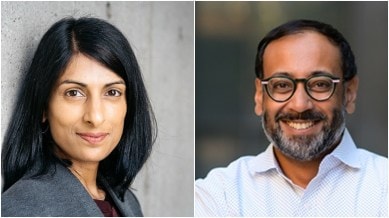📣 For more lifestyle news, click here to join our WhatsApp Channel and also follow us on Instagram
Optometrist Puthussery, epidemiologist Dasgupta among MacArthur Grant winners
The grant is constituted in the name of Catharine and John Donald MacArthur and recognises seminal and original contributions made by scientists, intellectuals and artists.

Optometrist Teresa Puthussery is focused on finding a solution to restore the vision of patients suffering from untreatable visual impairment.
On October 8, the 46-year-old Australia-born was adjudged as one the of 22 ‘genius’ winners of the MacArthur Grant. The winners of the fellowship will receive a cash award worth $800,000 as stipend.
monthly limit of free stories.
with an Express account.
The grant is constituted in the name of Catharine and John Donald MacArthur and recognises seminal and original contributions made by scientists, intellectuals and artists.
At the time of his death in 1978, Donald MacArthur was one of the wealthiest men in America and the sole owner of the nation’s largest privately held insurance company.
Puthussery’s lab at the Herbert Wertheim School of Optometry & Vision Science at the University of California recently discovered a rare type of ganglion cell, damage to which could result in permanent vision loss.
Many of her works on retinal circuitry in understanding the human visual system could pave the way for treating serious neurodegenerative diseases, such as glaucoma.
Estimates from 2020, as per research publications, suggest that globally 3.61 million people lost their vision and 4.14 million were visually impaired due to glaucoma.
Puthussery is currently involved in the ‘Moonshot’ project, wherein scientists, with the help of stem cells, are trying to generate new photoreceptors in the lab, transplant them into damaged retina and attempt vision restoration.
This project is being done in collaboration with the University of Rochester and University of Wisconsin.
Another recipient of the 2025 MacArthur Grant is Nabarun Dasgupta, an epidemiologist at the University of North Carolina.
Using simple test kits, he has been leading the effort to mitigate harmful use of drugs and prevent deaths linked to opioid overdose.
At the Opioid Data lab, his team offers free testing of community-donated samples from across the USA to check for unregulated substances or simple drugs.
According to the World Health Organization (WHO), about 6 lakh deaths in 2019 were linked to drug use. And 80% of these were linked to opioids and about 25% related to opioid overdose. Opioids include medicines such as morphine, fentanyl and tramadol, commonly used for pain relief.
But their non-medical use, prolonged use and misuse lead to health problems. Dasgupta, who is also a medical entrepreneur, is focused on broadening access to inexpensive or free naloxone, which reverses opioid overdose.
📣 For more lifestyle news, click here to join our WhatsApp Channel and also follow us on Instagram